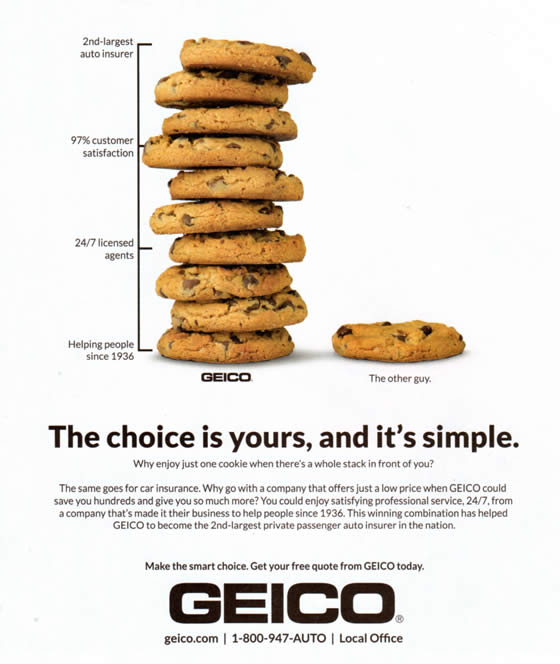Scarcity vs. Abundance in GEICO Ad
Is abundance better than scarcity? Lately, insurance giant GEICO has been running an ad comparing their advantages to “the other guy.” They illustrate it with a stack of ten chocolate chip cookies for GEICO while their unnamed competitor gets just one cookie.

At first glance, the imagery seems perfect. Everyone likes cookies, and, the ad implies, you get a lot more cookies when you buy your insurance from GEICO. And, the ad may indeed work exactly as intended.
The Ironic Twist
Here’s the irony, though… Can you guess what the classic experiment demonstrating the power of scarcity used as the key prop? Yep, chocolate chip cookies!
In 1975, scientists at the University of Virginia and the University of North Carolina had subjects evaluate chocolate chip cookies that were abundant (10 cookies in the sample) or scarce (just two cookies). The actual cookies were identical.
Scarcity vs. abundance paradox plays out in GEICO ad. #Neuromarketing #influence Share on XThe subjects were asked, if given the opportunity, whether they would like to eat more cookies and also how attractive the cookies were.
The experimenters varied the conditions – in some cases, they merely showed the subjects the two sets of cookies. In other cases, they explained that the smaller group had been depleted either due to high demand or an accident.
One could predict that social proof (“other people wanted this batch”) would make the cookies that were scarce due to high demand would be more desirable. The scientists found, however, that in every condition the two cookies were considered more desirable than the ones in the group of ten. The cookies were the same, but manipulating scarcity made the subjects prefer the smaller group – sometimes by a huge difference.
Scarcity in Advertising
Many advertisers make scarcity a key element in their marketing efforts. Visit a travel site to find a hotel, and you’ll see overt scarcity and urgency ploys like, “Only 2 rooms left!” and “Booked 17 times in the last 24 hours.” Here’s an example from Booking.com:

Countdown timers, expiring deals, “limited quantity” banners, and many other techniques inject scarcity into an offering.
Scarcity cues increase conversion. #Neuromarketing #CRO Share on XIt’s clear, though, the GEICO ad folks didn’t have scarcity on their minds when this ad was created.
Great Ad, or Scarcity Backfire?
What do you think – does the GEICO ad work as intended, or might it be less effective due to the scarcity effect? The original experiments used groups of ten and two cookies; the GEICO ad has ten and one. Does that make the single cookie even more desirable? And, on the other hand, is a pile of ten cookies still much better than a lone, more desirable cookie?
Leave your thoughts in a comment!
Is this GEICO ad at odds with famous cookie experiment? #Neuromarketing Share on X